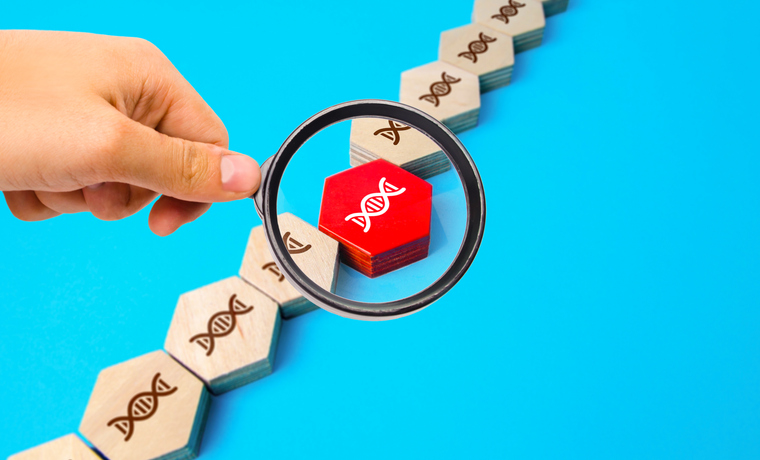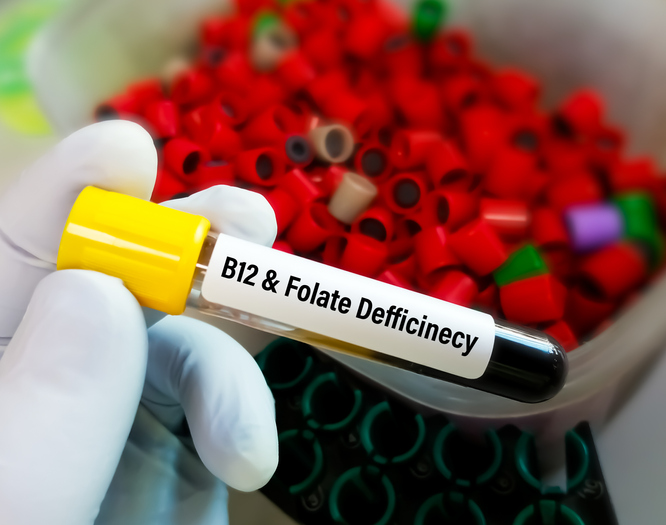Vegan Diet Not Only Risk for Vitamin B12 Deficiency. You May Have a Genetic Mutation

By Joy Stephenson-Laws, JD, Founder
If you are vegan or follow a mainly plant-based diet, it’s likely you have been warned about the risk of developing a vitamin B12 deficiency and take a supplement to prevent this. Vitamin B12 is mainly found in animal foods such as meat, fish, eggs and dairy foods.
B12 (one of the eight B vitamins) serves many purposes in the body, such as helping make DNA and red blood cells (that carry oxygen to your organs and give you energy and help prevent fatigue). This vitamin also helps keep your brain and immune system healthy and plays a role in preventing a type of anemia called megaloblastic anemia, which may leave you feeling tired and weak.
Not only is having sufficient B12 important for preventing and fighting disease and giving your body energy, but it may also play a major role in your mental health. This nutrient may even help prevent memory loss associated with aging.
If you regularly consume animal-based foods, you might think that there is no way you could develop B12 deficiency. This, however, is not necessarily the case.
MTHFR Genetic MutationMTHFR stands for methylenetetrahydrofolate reductase. Quite a mouthful! We all have two MTHFR genes (we inherited one each from our parents).
“People with a mutation in 1 MTHFR gene are said to be heterozygous; if mutations are present in both genes, the person is said to be homozygous or compound heterozygous for the mutation(s),” according to an article from Circulation, a scientific journal published for the American Heart Association.
“The most common MTHFR mutation is called the MTHFR C677T mutation. The mutation is extremely common in certain ethnic and geographic populations.”
For example, the article from Circulation states that in the United States:
- 20 to 40 percent of white and Hispanic people are heterozygous for the C677T mutation
- Only 1 to 2 percent of black people have this mutation
If you look at North America, Europe and Australia together, 8 to 20 percent of the population is homozygous (mutation present in both MTHFR genes) for the C677T mutation. It is important to note that people who are heterozygous (so the mutation in one gene) can have reduced enzyme function (65 percent have normal function). Homozygous people only have a 30 percent chance of normal enzyme function.
What do I mean by normal enzyme function, and what does this have to do with vitamin B12?
Our MTHFR genes make the enzyme methylenetetrahydrofolate reductase called MTHFR for short. This enzyme works with another popular and very important B vitamin called folate (or vitamin B9. Vitamin B12 works in conjunction with folate to do those vital tasks such as making red blood cells. So if you have the C677T mutation, you are at a risk of both a folate and B12 deficiency because it is possible that your body will not be able to make enough forms of these vital nutrients that your body can actually use.

Check out this study published by the National Institutes of Health (NIH). The study examined 360 asymptomatic individuals. Of these individuals:
- 67 of the 360 individuals (18.6%) were homozygous for the C677T mutation
- Number of people with B12 deficiency was significantly higher among the homozygous people compared to the heterozygote participants as well as participants without any mutations at all
- Homozygotes had 4.2 times higher probability of having B12 deficiency
It is also really important to acknowledge that our bodies need folate and B12 to break down an amino acid called homocysteine.
“Normally, your body quickly breaks down homocysteine, so you have very little in your bloodstream. But if you have a change in an MTHFR gene, the MTHFR proteins your body makes may not process folate as well as they should. As a result, you may have increased levels of homocysteine in your blood,” reports the NIH.
Having higher homocysteine levels may increase the risk of developing cardiovascular disease. The study mentioned also found that homocysteine levels were more elevated in the homozygous individuals.
Furthermore, “Abnormal endothelial function was observed in homozygous subjects and was worse in homozygous subjects with vitamin B12 deficiency,” according to the study report.
Fortunately, “Endothelial function was normalized after B12 and folic acid treatment. We found that homozygosity for the C677T mutation is strongly associated with B12 deficiency. Coexistence of homozygosity for the C677T mutation and B12 deficiency is associated with endothelial dysfunction and can be corrected with vitamin B12 and folic acid treatment.”
This just goes to show the effectiveness of good supplements. We have the power to correct genetic variants that may cause issues if we are aware of our nutrient levels.
Nutrient testing is so important.You can experience no symptoms at all and still have a genetic mutation or B12 or folate deficiency. So I highly recommend starting with a comprehensive nutrient test. If the test reveals you have a B12 deficiency but you eat plenty of animal foods, this is a red flag in my opinion. I believe this would be a clue that something else is going on. From here, I would consider taking a MTHFR mutation test. This test will identify if you do have a genetic mutation and which one you have.
At the end of the day once you have answers, you can work with your doctor regarding making the necessary dietary changes and taking the proper supplements.
Remember, your genes are not your health destiny.
Enjoy your healthy life!
Disclaimer: This article is not intended to provide medical advice. Please consult with your doctor or another competent healthcare practitioner to get specific medical advice for your situation.
The pH professional health care team includes recognized experts from a variety of health care and related disciplines, including physicians, attorneys, nutritionists, nurses, and certified fitness instructors. This team also includes the members of the pH Medical Advisory Board, which constantly monitors all pH programs, products, and services. To learn more about the pH Medical Advisory Board, click here.







